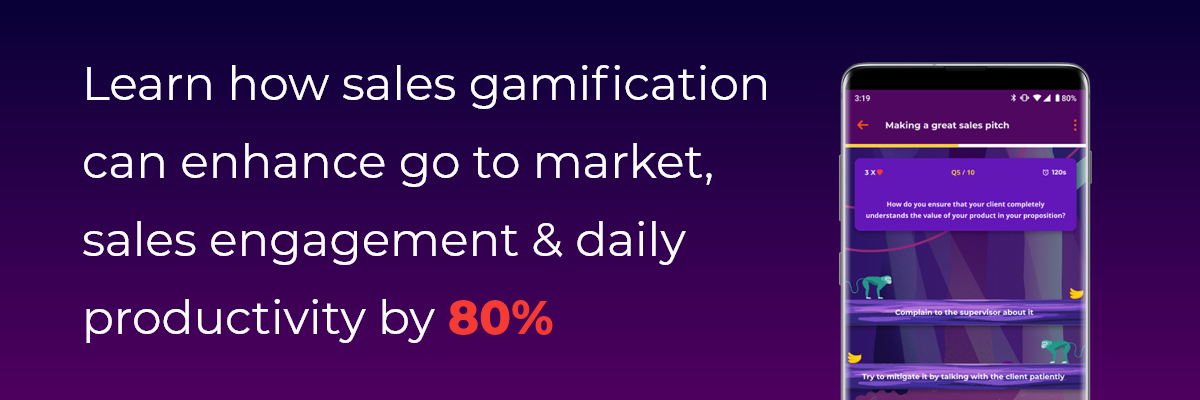According to LinkedIn, organisations spend approximately $15 billion on sales training every year and another $800 billion to incentivise the sales reps to stay. A competent salesforce helps the organisation to achieve its targets and provide a good customer service experience. With sales skill development at the core of an organisation’s development, the biggest challenge remains that of ensuring the retention of newly acquired skills. Sales enablement trends suggest that gamification yields positive results in sales skill development and reinforcement of sales training.
Microlearning vs Traditional Learning
Gamified microlearning involves teaching a specific skill or concept through nuggets of information using flashcards, short quizzes, or creative scenario-based learning. Although traditional training can also take a similar form what differentiates gamification and microlearning is the utilisation of game mechanics such as mapping of learner’s outcomes to achievements in the form of badges, scores, and a leader board that addresses motivation, engagement, and reinforcement by promoting knowledge recall to strengthen memory.
With more millennials entering the workforce the need of the hour for sales reps today is to access bite-sized and engaging sales training content that keeps them remain engaged & enhance their selling competencies.
Here are five sales competencies you can develop using gamification and microlearning to supercharge your sales representative’s productivity:
Planning: Planning for sales requires the sales reps to proactively identify the tasks that need to be performed and put them in order of urgency. Gamification and microlearning can help the learners to imitate sales planning in a virtual environment and plan by arranging tasks in order of importance. Although this sales planning environment is close to real situations without the threat of repercussions of bad planning, the learners can learn by trial and error method. In the end, the sales rep’s response can be compared with that of an expert to suggest how the salesperson could plan better. Gamified microlearning not only teaches them about the best way to plan but also about what bad planning could lead them to.
Establishing Rapport and Gaining Attention: Establishing rapport with customers is an essential skill required during interaction with both new and existing customers especially in the current virtual selling scenario. The best sales reps are often curious and keep trying new ways to build rapport with their customers. A game that lets the salesperson try different attention-grabbing methods and provides immediate feedback on the effectiveness or scope of improvement can help them to practice rapport building skills. The salesperson can then apply these learnings during customer interactions to maximize benefits.
Asking Great Questions: Most sales reps hesitate to ask questions either due to a lack of confidence or because they do not know what to ask. A scenario-based game wherein the learner is put in a simulated environment to ask questions and lead a conversation can help to prepare a learner. Such games can provide a list of probable questions that a salesperson can ask and let them select the most appropriate question based on the situation. While all the questions may be correct, but it is important for the learner to time them well and ask fewer but the right questions. A safe space where a salesperson can practice multiple times without the fear of being judged will help them boost their confidence.
Selling Skills: Developing selling competency requires a salesperson to practice selling conversations regularly. While it may not be feasible to practice every day with your peers or trainers, a gamified module can help you practice indefinitely in different situations. Two-way interaction between a sales rep and a customer-led based on the customer’s reaction will help a salesperson to improve his selling skills and change their course of interaction if required. In real life, the sales rep may not get feedback on their performance but the feedback through the game will help the sales reps to know the impact of their conversation, anticipate customer responses and learn ways to improve the conversation further.
Answering Objections: When a sales representative is in a client meeting, they want to be able to answer client questions regarding the product and handle objections on the spot. Most sales reps struggle with handling customer objections either due to a lack of confidence or due to a lack of information. Microlearning modules provide quick access to the information sales professionals need, in real-time during the client interactions. With the Microskill® content organised topic wise, it is easier for the representative to find the exact information to handle the client objection. Rather than bringing the sales reps together to share information and updates frequently, game-based learning modules and assessments can be deployed on the sales reps mobile enabling them to learn at their own time and pace.
Gamified microlearning not only helps in building skills and increasing retention but is also a good way to enable the salesperson to learn and practice concepts exactly when they need it. It also helps to reduce the stress that is associated with performance in front of customers or peers. Practice-based learning which rewards the learners with scores and badges in the end helps to improve an employee’s morale and motivates them to improve their behavioural skills. Besides, the data captured through game-based assessments allows the trainers to gain valuable insights about the learning curve of a sales rep and assign required reinforcement training to them without the need for a 1-1 interaction making learning an overall efficient process.
Looking for an effective microlearning platform for your salesforce? Write to us at hello@masteroapp.com or schedule a demo to learn how Master-O can upskill your field force at scale & speed.

